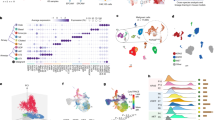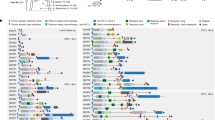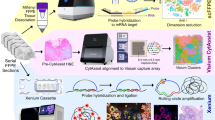Abstract
Chemokines are important regulators of directional cell migration and tumor metastasis. A genome-wide transcriptome array designed to uncover novel genes silenced by methylation in lung cancer identified the CXC-subfamily of chemokines. Expression of 11 of the 16 known human CXC-chemokines was increased in lung adenocarcinoma cell lines after treatment with 5-aza-2′-deoxycytidine (DAC). Tumor-specific methylation leading to silencing of CXCL5, 12 and 14 was found in over 75% of primary lung adenocarcinomas and DAC treatment restored the expression of each of the silenced gene. Forced expression of CXCL14 in H23 cells, where this gene is silenced by methylation, increased cell death in vitro and dramatically reduced the in vivo growth of lung tumor xenografts through necrosis of up to 90% of the tumor mass. CXCL14 re-expression had a profound effect on the genome altering the transcription of over 1000 genes, including increased expression of 30 cell-cycle inhibitor and pro-apoptosis genes. In addition, CXCL14 methylation in sputum from asymptomatic early-stage lung cancer cases was associated with a 2.9-fold elevated risk for this disease compared with controls, substantiating its potential as a biomarker for early detection of lung cancer. Together, these findings identify CXCL14 as an important tumor suppressor gene epigenetically silenced during lung carcinogenesis.
This is a preview of subscription content, access via your institution
Access options
Subscribe to this journal
Receive 50 print issues and online access
$259.00 per year
only $5.18 per issue
Buy this article
- Purchase on Springer Link
- Instant access to full article PDF
Prices may be subject to local taxes which are calculated during checkout




Similar content being viewed by others
References
Arenberg DA, Keane MP, DiGiovine B, Kunkel SL, Morris SB, Xue YY et al. (1998). Epithelial-neutrophil activating peptide (ENA-78) is an important angiogenic factor in non-small cell lung cancer. J Clin Invest 102: 465–472.
Baylin SB, Ohm JE . (2006). Epigenetic gene silencing in cancer—a mechanism for early oncogenic pathway addiction? Nat Rev Cancer 6: 107–116.
Belinsky SA, Klinge DM, Stidley CA, Issa JP, Herman JG, March TH et al. (2003). Inhibition of DNA methylation and histone deacetylation prevents murine lung cancer. Cancer Res 63: 7089–7093.
Belinsky SA, Liechty KC, Gentry FD, Wolf HJ, Rogers J, Vu K et al. (2006). Promoter hypermethylation of multiple genes in sputum precedes lung cancer incidence in a high-risk cohort. Cancer Res 66: 3338–3344.
Belinsky SA, Nikula KJ, Palmisano WA, Michels R, Saccomanno G, Gabrielson E et al. (1998). Aberrant methylation of p16(INK4a) is an early event in lung cancer and a potential biomarker for early diagnosis. Proc Natl Acad Sci USA 95: 11891–11896.
Bennett KL, Karpenko M, Lin MT, Claus R, Arab K, Dyckhoff G et al. (2008). Frequently methylated tumor suppressor genes in head and neck squamous cell carcinoma. Cancer Res 68: 4494–4499.
Chin LJ, Ratner E, Leng S, Zhai R, Nallur S, Babar I et al. (2008). A SNP in a let-7 microRNA complementary site in the KRAS 3′ untranslated region increases non-small cell lung cancer risk. Cancer Res 68: 8535–8540.
Cirincione R, Lintas C, Conte D, Mariani L, Roz L, Vignola AM et al. (2006). Methylation profile in tumor and sputum samples of lung cancer patients detected by spiral computed tomography: a nested case-control study. Int J Cancer 118: 1248–1253.
Darash-Yahana M, Gillespie JW, Hewitt SM, Chen YY, Maeda S, Stein I et al. (2009). The chemokine CXCL16 and its receptor, CXCR6, as markers and promoters of inflammation-associated cancers. PLoS One 4: e6695.
Deng T, Kuang Y, Wang L, Li J, Wang Z, Fei J . (2009). An essential role for DNA methyltransferase 3a in melanoma tumorigenesis. Biochem Biophys Res Commun 387: 611–616.
Gardiner-Garden M, Frommer M . (1987). CpG islands in vertebrate genomes. J Mol Biol 196: 261–282.
Gore SD, Baylin S, Sugar E, Carraway H, Miller CB, Carducci M et al. (2006). Combined DNA methyltransferase and histone deacetylase inhibition in the treatment of myeloid neoplasms. Cancer Res 66: 6361–6369.
Hromas R, Broxmeyer HE, Kim C, Nakshatri H, Christopherson II K, Azam M et al. (1999). Cloning of BRAK, a novel divergent CXC chemokine preferentially expressed in normal versus malignant cells. Biochem Biophys Res Commun 255: 703–706.
Hsu HS, Chen TP, Wen CK, Hung CH, Chen CY, Chen JT et al. (2007). Multiple genetic and epigenetic biomarkers for lung cancer detection in cytologically negative sputum and a nested case-control study for risk assessment. J Pathol 213: 412–419.
Jacinto FV, Ballestar E, Ropero S, Esteller M . (2007). Discovery of epigenetically silenced genes by methylated DNA immunoprecipitation in colon cancer cells. Cancer Res 67: 11481–11486.
Kim TY, Zhong S, Fields CR, Kim JH, Robertson KD . (2006). Epigenomic profiling reveals novel and frequent targets of aberrant DNA methylation-mediated silencing in malignant glioma. Cancer Res 66: 7490–7501.
Kurth I, Willimann K, Schaerli P, Hunziker T, Clark-Lewis I, Moser B . (2001). Monocyte selectivity and tissue localization suggests a role for breast and kidney-expressed chemokine (BRAK) in macrophage development. J Exp Med 194: 855–861.
McKinnon CM, Lygoe KA, Skelton L, Mitter R, Mellor H . (2008). The atypical Rho GTPase RhoBTB2 is required for expression of the chemokine CXCL14 in normal and cancerous epithelial cells. Oncogene 27: 6856–6865.
Meissner A, Jaenisch R . (2006). Generation of nuclear transfer-derived pluripotent ES cells from cloned Cdx2-deficient blastocysts. Nature 439: 212–215.
Miyazaki H, Patel V, Wang H, Edmunds RK, Gutkind JS, Yeudall WA . (2006). Down-regulation of CXCL5 inhibits squamous carcinogenesis. Cancer Res 66: 4279–4284.
Morris MR, Gentle D, Abdulrahman M, Clarke N, Brown M, Kishida T et al. (2008). Functional epigenomics approach to identify methylated candidate tumour suppressor genes in renal cell carcinoma. Br J Cancer 98: 496–501.
Moser B, Loetscher P . (2001). Lymphocyte traffic control by chemokines. Nat Immunol 2: 123–128.
Mu X, Chen Y, Wang S, Huang X, Pan H, Li M . (2009). Overexpression of VCC-1 gene in human hepatocellular carcinoma cells promotes cell proliferation and invasion. Acta Biochim Biophys Sin (Shanghai) 41: 631–637.
Muller A, Homey B, Soto H, Ge N, Catron D, Buchanan ME et al. (2001). Involvement of chemokine receptors in breast cancer metastasis. Nature 410: 50–56.
Ozawa S, Kato Y, Ito S, Komori R, Shiiki N, Tsukinoki K et al. (2009). Restoration of BRAK/CXCL14 gene expression by gefitinib is associated with antitumor efficacy of the drug in head and neck squamous cell carcinoma. Cancer Sci 100: 2202–2209.
Ozawa S, Kato Y, Komori R, Maehata Y, Kubota E, Hata R . (2006). BRAK/CXCL14 expression suppresses tumor growth in vivo in human oral carcinoma cells. Biochem Biophys Res Commun 348: 406–412.
Palmisano WA, Crume KP, Grimes MJ, Winters SA, Toyota M, Esteller M et al. (2003). Aberrant promoter methylation of the transcription factor genes PAX5 alpha and beta in human cancers. Cancer Res 63: 4620–4625.
Parsanejad R, Fields WR, Steichen TJ, Bombick BR, Doolittle DJ . (2008). Distinct regulatory profiles of interleukins and chemokines in response to cigarette smoke condensate in normal human bronchial epithelial (NHBE) cells. J Interferon Cytokine Res 28: 703–712.
Phillips RJ, Burdick MD, Lutz M, Belperio JA, Keane MP, Strieter RM . (2003). The stromal derived factor-1/CXCL12-CXC chemokine receptor 4 biological axis in non-small cell lung cancer metastases. Am J Respir Crit Care Med 167: 1676–1686.
Rauch TA, Wu X, Zhong X, Riggs AD, Pfeifer GP . (2009). A human B cell methylome at 100-base pair resolution. Proc Natl Acad Sci USA 106: 671–678.
Schuebel KE, Chen W, Cope L, Glockner SC, Suzuki H, Yi JM et al. (2007). Comparing the DNA hypermethylome with gene mutations in human colorectal cancer. PLoS Genet 3: e157.
Schwarze SR, Luo J, Isaacs WB, Jarrard DF . (2005). Modulation of CXCL14 (BRAK) expression in prostate cancer. Prostate 64: 67–74.
Shames DS, Girard L, Gao B, Sato M, Lewis CM, Shivapurkar N et al. (2006). A genome-wide screen for promoter methylation in lung cancer identifies novel methylation markers for multiple malignancies. PLoS Med 3: e486.
Shellenberger TD, Wang M, Gujrati M, Jayakumar A, Strieter RM, Burdick MD et al. (2004). BRAK/CXCL14 is a potent inhibitor of angiogenesis and a chemotactic factor for immature dendritic cells. Cancer Res 64: 8262–8270.
Shurin GV, Ferris RL, Tourkova IL, Perez L, Lokshin A, Balkir L et al. (2005). Loss of new chemokine CXCL14 in tumor tissue is associated with low infiltration by dendritic cells (DC), while restoration of human CXCL14 expression in tumor cells causes attraction of DC both in vitro and in vivo. J Immunol 174: 5490–5498.
Speetjens FM, Kuppen PJ, Sandel MH, Menon AG, Burg D, van de Velde CJ et al. (2008). Disrupted expression of CXCL5 in colorectal cancer is associated with rapid tumor formation in rats and poor prognosis in patients. Clin Cancer Res 14: 2276–2284.
Strieter RM, Belperio JA, Burdick MD, Sharma S, Dubinett SM, Keane MP . (2004). CXC chemokines: angiogenesis, immunoangiostasis, and metastases in lung cancer. Ann N Y Acad Sci 1028: 351–360.
Tessema M, Willink R, Do K, Yu YY, Yu W, Machida EO et al. (2008). Promoter methylation of genes in and around the candidate lung cancer susceptibility locus 6q23-25. Cancer Res 68: 1707–1714.
Tessema M, Yu YY, Stidley CA, Machida EO, Schuebel KE, Baylin SB et al. (2009). Concomitant promoter methylation of multiple genes in lung adenocarcinomas from current, former and never smokers. Carcinogenesis 30: 1132–1138.
Wendt MK, Cooper AN, Dwinell MB . (2008). Epigenetic silencing of CXCL12 increases the metastatic potential of mammary carcinoma cells. Oncogene 27: 1461–1471.
Wendt MK, Johanesen PA, Kang-Decker N, Binion DG, Shah V, Dwinell MB . (2006). Silencing of epithelial CXCL12 expression by DNA hypermethylation promotes colonic carcinoma metastasis. Oncogene 25: 4986–4997.
Yang AS, Doshi KD, Choi SW, Mason JB, Mannari RK, Gharybian V et al. (2006). DNA methylation changes after 5-aza-2′-deoxycytidine therapy in patients with leukemia. Cancer Res 66: 5495–5503.
Yoshino M, Suzuki M, Tian L, Moriya Y, Hoshino H, Okamoto T et al. (2009). Promoter hypermethylation of the p16 and Wif-1 genes as an independent prognostic marker in stage IA non-small cell lung cancers. Int J Oncol 35: 1201–1209.
Yuvaraj S, Griffin AC, Sundaram K, Kirkwood KL, Norris JS, Reddy SV . (2009). A novel function of CXCL13 to stimulate RANK ligand expression in oral squamous cell carcinoma cells. Mol Cancer Res 7: 1399–1407.
Zhou W, Jiang Z, Song X, Liu Y, Wen P, Guo Y et al. (2008). Promoter hypermethylation-mediated down-regulation of CXCL12 in human astrocytoma. J Neurosci Res 86: 3002–3010.
Acknowledgements
We thank Elizabeth Burki, PhD, for recruitment of lung cancer patients, Maria Picchi, MPH, and Chris Stidley, PhD, for statistical analysis and Wayne Yu, PhD, at Johns Hopkins for running Agilant expression arrays. Grant support: supported largely by NIH Grant R01 ES008801 and in part by P50 CA58184.
Author information
Authors and Affiliations
Corresponding author
Ethics declarations
Competing interests
SA Belinsky is a consultant to Oncomethylome Sciences. Under a licensing agreement between Lovelace Respiratory Research Institute and Oncomethylome Sciences, nested MSP was licensed to Oncomethylome Sciences, and the author is entitled to a share of the royalties received by the Institute from the sales of the licensed technology. The Institute, in accordance with its conflict-of-interest policies, is managing the terms of these arrangements.
Additional information
Supplementary Information accompanies the paper on the Oncogene website
Rights and permissions
About this article
Cite this article
Tessema, M., Klinge, D., Yingling, C. et al. Re-expression of CXCL14, a common target for epigenetic silencing in lung cancer, induces tumor necrosis. Oncogene 29, 5159–5170 (2010). https://doi.org/10.1038/onc.2010.255
Received:
Revised:
Accepted:
Published:
Issue Date:
DOI: https://doi.org/10.1038/onc.2010.255
Keywords
This article is cited by
-
A comprehensive bioinformatics analysis to identify potential prognostic biomarkers among CC and CXC chemokines in breast cancer
Scientific Reports (2022)
-
Comparative transcriptome analyses reveal genes associated with SARS-CoV-2 infection of human lung epithelial cells
Scientific Reports (2021)
-
Foam Cell-Derived CXCL14 Muti-Functionally Promotes Atherogenesis and Is a Potent Therapeutic Target in Atherosclerosis
Journal of Cardiovascular Translational Research (2020)
-
Chemokines in the cancer microenvironment and their relevance in cancer immunotherapy
Nature Reviews Immunology (2017)
-
The chemokines CXCL12 and CXCL14 differentially regulate connective tissue markers during limb development
Scientific Reports (2017)



